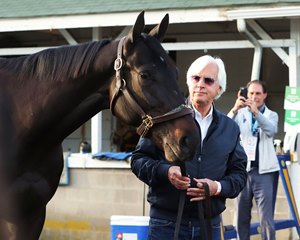Experts Blast Maylin Study of Medina Spirit Positive


With a Kentucky Horse Racing Commission hearing on the disqualification of Medina Spirit from the 2021 Kentucky Derby presented by Woodford Reserve (G1) to begin June 28, veterinary reports reviewed by BloodHorse are critical of Dr. George Maylin's study linking betamethasone found in blood samples to the use of the topical ointment Otomax and not an injection.
Standard post-race lab tests at Industrial Laboratories and the University of California-Davis confirmed the presence of betamethasone in Medina Spirit's blood samples. Based on those results, Kentucky stewards disqualified Medina Spirit from his Derby win, suspended Bob Baffert from training for 90 days, and fined him $7,500. The upcoming KHRC hearing follows an appeal of the stewards' rulings.
Maylin's study came about at the urging of attorneys for Baffert and Medina Spirit's owner, Amr Zedan of Zedan Racing Stables. It was performed at the New York Equine Drug Testing and Research Laboratory, where Maylin is the director. He tested post-race urine samples delivered to the lab July 14, 2021, and reported he performed a separate experiment using two Thoroughbreds.
By letter dated Dec. 3, 2021, Maylin concluded the substance in question was betamethasone valerate, an ingredient found in Otomax. The letter is included in court records. That day, attorneys for Baffert and Zedan referenced the letter in concluding in a public announcement that the betamethasone was caused by the topical application as opposed to an injection.
But a number of experts are questioning Maylin's study and findings. Dr. Mark Papich, a professor of clinical pharmacology at the North Carolina State University College of Veterinary Medicine and a former president of the American College of Veterinary Clinical Pharmacology, issued a report obtained from court records by BloodHorse that challenges the completeness and conclusions of Maylin's work.
Dr. Heather Knych, section head of the Kenneth L. Maddy Equine Analytical Pharmacology Laboratory at the School of Veterinary Medicine at the University of California-Davis, reported that Dr. Maylin's research packet does not present data that supports his definitive identification of betamethasone valerate.
Knych's report, also obtained from court records, says Maylin's identification of betamethasone valerate in a Medina Spirit urine sample pushes beyond the limits of methodology, in that either much of the data does not meet minimum laboratory analytical standards or data critical to the determination made by Maylin is omitted. Knych is also critical of what she describes as deficient quality control measures, something also mentioned in the Papich report.
Papich questions the Maylin report, which consists of 194 pages, on several fronts. They include:
—A failure to identify which scientific guideline was used for validation of his analysis;
—Multiple holes in Maylin's description of an experiment on two Thoroughbred research horses using the administration of Otomax, including a failure to reveal the concentration of betamethasone valerate that was detected; and
—The fact that Maylin's laboratory never tested for the parent compound betamethasone, which Papich describes as the subject of the entire case.
The Papich report concludes that the presence or absence of components of Otomax in urine or blood samples is irrelevant because Medina Spirit tested positive for betamethasone; that the absence of betamethasone acetate in testing does not prove or disprove the possibility of its administration; and when an Olympic athlete tests positive for a prohibited substance, the source of the substance, whether by injection, cream, contaminated meat or dietary supplement, is not relevant. The outcome is the same.

According to Papich, Maylin's work on the Medina Spirit sample showed a response below the detection limit for betamethasone acetate, which is associated with an injection of the substance; a "possible peak" for betamethasone valerate; and the presence of clotrimazole, an ingredient of Otomax. Papich raises questions as to what these findings mean.
The Knych paper further delves into the pharmacological effects of betamethasone and says betamethasone is 25 to 35 times more powerful than naturally occurring hydrocortisone, known as cortisol. However, she notes that there are no published, peer-reviewed scientific studies describing the minimum effective blood concentration of betamethasone in horses.
After noting that betamethasone is a corticosteroid 25 times more powerful than hydrocortisone, Papich says its effects are more potent and longer-acting after systemic administration, whether by injection or by absorption from a topical ointment. According to Papich, whether the route of administration makes a difference is unknown because the issue has not been studied in horses, but he opines there is the possibility of a pharmacological effect in tissues such as joints.
Maylin's December report letter characterized his experimental work as a research project that will be submitted to a peer-reviewed journal. He said the work would remain "confidential" until the data is submitted for peer review. The court record that is the BloodHorse source for this story does not indicate whether the data has been submitted for review, or reviewed.
A request for comment directed to Maylin and his attorney had received no response at the time this story was published.
Maylin told BloodHorse in early August 2021 that an order by Franklin Circuit Judge Thomas Wingate authorizing delivery of urine samples to him requires the production of "incontrovertible" test results. He told the Louisville Courier-Journal in late August the order requires "intractable results, absolute perfect results. That's what we are doing."
